- 4 Québec products to add to your recipes
- 10 Ways to Eat More Fruit Every Day
- Brighten up Your Plate with Citrus Fruit
- 12 Fresh Five-Star Salads
- Discover Hot and Sweet Peppers
- Eat More Nuts
- Enjoy Locally Grown Vegetables Year-Round
- Ways to Use Garden Vegetables
- Ketchups, Relishes, Chutneys, Marinades and Aromatic Vinegars
- Cranberries
- Cook with potatoes
- 8 Easy Recipes to Prepare Pumpkin—Differently
- Eat your veggies from the leaves to the roots
- Rediscover Fries!
- Super Salads!
- Eat more chickpeas
- Fruits and vegetables on the barbecue
- Apples on the menu
Ways to Use Garden Vegetables

Colorful and crisp, garden vegetables lend themselves to so many flavourful combinations. These earthly treasures are a feast for the eye as well as the palate.
Sides and appetizer ideas
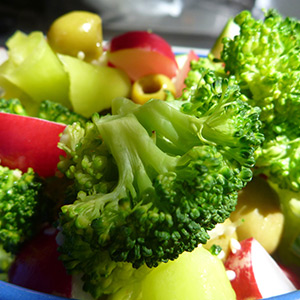
- Slightly blanch small bunches of broccoli and top them with a horseradish and walnut vinaigrette
- Arrange small broccoli florets over a tomato or red hot pepper coulis
- Cut your favourite vegetables julienne style, then sear in a light oil with a few drops of sesame oil added
- Make a red hot pepper coulis with lemon juice and a drop of cream to go with salmon and other seafood dishes
- Brush garlic and herb-flavoured olive oil on grilled hot peppers, summer squash, eggplants and onions
- Make cold or warm salads with green beans, shrimp and almonds; new potatoes, red onions, walnuts and goat cheese; or cauliflower, red hot peppers and black olives
Get creative with soups
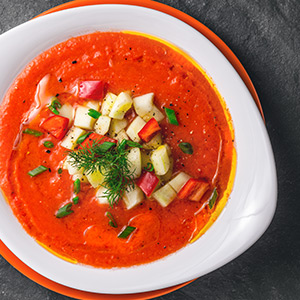
- Upgrade an everyday soup with exotic herbs or spices
- Add artichoke bottoms, cooked and diced, in minestrone or cream of asparagus soups
- Purée basil, garlic and olive oil and use as a garnish over green bean and potato soup
- Make a cold soup of summer squash, onions, olive oil and plain yogurt
- Add curry and coriander to carrot soup
- Enrich cream of broccoli soup with cubes of blue d’Auvergne
- Chop eggplant and cook with tomato soup
- Make an apple velouté to add to a radish, tomato and beet soup then top with citrus fruit zest
Sweet and salty
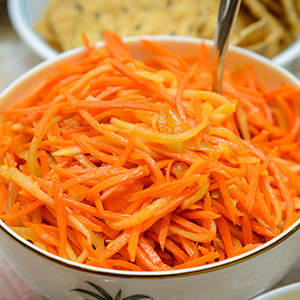
- Onion is enjoyed both as an accompanying vegetable and condiment — it can be caramelized with veal, candied with pâtés or used for fruit chutneys
- Carrots pair well with citrus fruit — grated carrots, quartered oranges, grapefruit along with a little cinnamon makes a simple, satisfying salad
- Try mixing carrot juice with honey and coconut milk for a deliciously sweet drink
- When cooking carrots, add a trickle of apple or orange juice to enhance their sweet taste
- Chutneys and marinades of fruit and vegetables with a bitter-sweet taste pair well with cheeses and meat dishes
- Use vegetables to make sweet treats, such as carrot cookies, summer-squash muffins, beet and carrot cake or green tomato pie.
Preserving summer's bounty
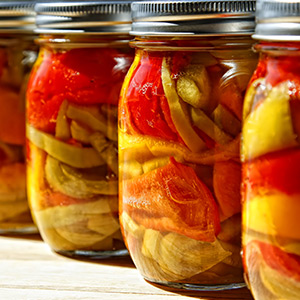
- Home canning and freezing vegetables are two ways to take advantage of their abundance at summer's end
- Stored in a dark, dry and cool environment, homemade preserves keep so long as the seal remains intact — but they're best enjoyed within a year of canning
- Watch for signs of spoilage such as a bulging lid, a leaky jar, a spurt of liquid upon opening or viscous or pulpy marinades. These are signs that the jar is damaged — avoid tasting the product and discard it immediately!
Tips and tricks
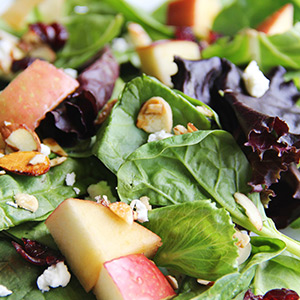
- Keep lettuce and spinach extra fresh by washing, draining, wrapping in absorbent paper and refrigerating them in an airproof plastic bag
- When buying leafy greens that come in airtight sealed packages, refrigerate them that way
- Do not wash other fresh vegetables before storing because this accelerates spoilage
- Cook vegetables as quickly as possible and with methods that require little water, such as steaming, to preserve their nutritional value
- Keep leftover vegetable broth as it contains nutritional elements and can be used for soups or sauces;
- Freeze leftover broth in ice-cube trays and place the frozen cubes in freezer bags to use only the necessary amount when desired
- Vegetables stored in plastic bags made especially for freezing will keep for up to a year in a freezer at –18°C
- Most frozen vegetables do not need to be thawed before cooking, but cooking time will be shorter than when using fresh vegetables
- Enjoy fresh vegetables as quickly as possible to get more of their nutritional value
- With the exception of onions, which should be left uncovered, most vegetables will keep in the refrigerator in a perforated plastic vegetable bag
- Broccoli, spinach and green and yellow beans keep for 4 or 5 days
- Fresh carrots, cauliflower, hot peppers, tomatoes, radishes, new potatoes, summer squash and lettuce all last up to a week
- Onions and beets are good for up to 4 weeks
Expert Tip
Cut the green tops off root gourd vegetables (carrots, radishes, beets) before storing because they dehydrate the vegetable and diminish its nutritional value















